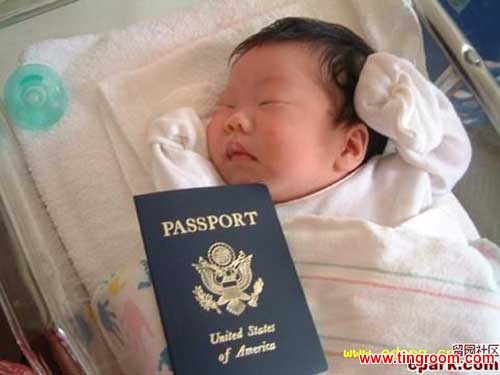CCTV9英语新闻:中国妇女涌向国外生孩子
(单词翻译:单击)
The global birth-tourism industry is booming as more and more Chinese women look to give birth abroad. According to a report by ABC news, the number of Chinese women going to Saipan, a U.S. Territory in the pacific, to give birth increased 35 fold between 2009 and 2012. In 2012 a staggering 71% of all births in Saipan were to Chinese women, who gave birth to 282 babies.

The global birth-tourism industry is booming as more and more Chinese women look to give birth abroad.
According to the US’ National Center for Maternal1 and Infant Health, the number of Chinese women who went to the US to give birth was 4,200 in 2008, and 5,000 in 2010. In 2012, that number had skyrocketed to over 10,000. While the temptation of getting US citizenship2 for their children is high among Chinese women, more questions have come up.
Born in the US. It gives many Chinese a high-minded vision of being parents to Americans.
It seems an easy enough step to take: just type "give birth in the US" in a searching engine and up pops the phone numbers of more than ten agencys ready to help Chinese women give birth in the US, making their child an instant citizen.
Yet some parents who give their child foreign citizenship by birthing them abroad, find that an unexpected reality when they bring their infant back to China. The Guo family lived in the US for ten years, and their two children were born there. Now, back in Beijing they’ve discovered their children’s citizenship to be costly3 burden.
"Many people go abroad to deliver their babies, but they have to face a whole lot of questions afterwards, education for one,because these children don’t have Chinese ’Hukou’. That’s an issue that will trouble their parents for at least 18 years. It’s absolutely a different story than the one the agencys tell.” Mr. Guo said.
Guo’s daughter Guo Meiqian is in primary school. As American citizen, she’s not entitled to the same education privileges as Chinese citizens. The Guo’s have chosen to send her to an expensive international school, far from where they live.
"Our two children’s education costs us about 170,000 yuan every year. My daughter’s primary school tuition fee is 50,000 yuan, which is relatively4 low.” Ms. Lu said.
If Meiqian’s parents had chosen to remain in the US, her public school education would have been free; a privilege that entices5 many Chinese to give birth abroad.
But the parents say they weren’t prepared to leave their kids alone in the US, even thought that means their children’s health care costs are higher than Chinese citizens.
"My son was told to get a Hepatitis B vaccine6 shot. We showed his medical record in the US but the doctors in Beijing said the vaccine in China is different and suggested we taken him back to the US for his second shot. So medical care is another difficult issue for us.”
Guo of course can’t go back to the US every time their son or daughter gets sick, and that means they have to buy their children expensive health insurance for foreigns.
 收听单词发音
收听单词发音 



